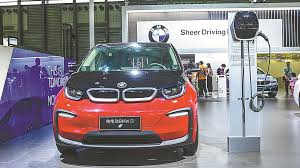Chinese online users criticized the German car manufacturer BMW on Thursday, accusing it of discrimination at the Shanghai auto show over accusations that employees at its Mini stand preferred foreign visitors over local ones during an ice cream giveaway promotion.
Mini expressed regret for the situation, blaming inadequate internal management and promising to enhance training in a statement posted on its official Weibo account.
With over 93 million views and users reposting images and videos of an incident that local media reported happened on Wednesday, the topic “BMW Mini” rose to the second position in searches on China’s Weibo social media platform.
The debate occurs as BMW and other German automakers compete to keep on top of consumer trends in a nation where domestic competitors have been aggressively stealing market share at the Shanghai auto show.
In one video, two Chinese employees can be seen telling some locals who came to the Mini stand that the complimentary ice cream has run out before quickly handing a tub to a foreign attendee.
One Weibo commenter remarked, “This has destroyed my positive impression of BMW.”
According to an individual with knowledge of the situation, the incident occurred after the booth had distributed 300 serves of ice cream intended for guests, and the foreigner in the video was a BMW employee.
The insider, who wished to remain anonymous owing to the delicate nature of the situation, claimed that the personnel was not BMW employees but rather temporary employees hired locally for the show.
Oliver Zipse, Chief Executive Officer of BMW, highlighted the value of the Chinese market to the manufacturer in presentations earlier this week by claiming that many of its cars’ features were inspired by China and that the nation was ahead of the curve globally in terms of auto trends.
Chinese consumers have been paying closer attention to how major brands behave in recent years and have become more critical of international or domestic enterprises for perceived slights or for failing to respect Chinese territorial claims.
At times, such criticism has exploded into widespread consumer boycotts. Sales in China for Dolce & Gabbana decreased in 2019 as a result of outrage at an ad campaign that was criticized as racist by celebrities and on social media. The upscale Italian company apologized and claimed there was a “cultural misunderstanding”.

















